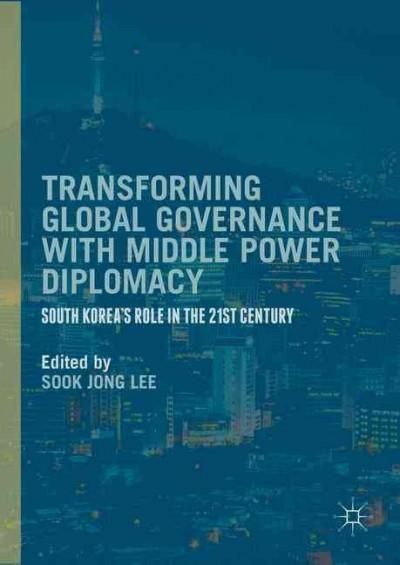
Transforming Global Governance with Middle Power Diplomacy: South Korea’s Role in the 21st Century
단행본 | 2016-07-01
Sook Jong Lee
Introduction
This book examines South Korea’s recent strategic turn to middle power diplomacy, evaluating its performance so far in key areas of security, maritime governance, trade, and climate change. In particular, the authors pay special attention to how South Korea’s middle power diplomacy can contribute to making the U.S.-China competition in East Asia benefit Korea.
The contributors discuss the opportunities and limits of this middle power diplomacy role, exploring how Korea can serves as a middleman in Sino-Japanese relations, rather than as a US ally against China; use rich trade networks to negotiate beneficial free trade agreements; and embracing its role as a leader in climate change policy, along with other topics. This book is a must read for foreign policy officials and experts who engage in the Asia-Pacific region, rekindling the academic study of middle powers whose influence is only augmenting in our increasingly networked twenty-first century world.
This book is part of the Middle Power Diplomacy Initiative (MPDI) project which began in 2013 and was funded by the MacArthur Foundation. The MPDI seeks to understand the role of East Asian middle powers in reconfiguring the hub-and-spokes model of bilateral alliances in the region. Specifically, MPDI seeks to identify middle powers, explore issues for a middle power network collaboration to enhance U.S.-China cooperation and strengthen existing norms and values, and facilitate the formation of a middle power network among U.S. allies without triggering strategic backlash from China.
Endorsements
“South Korea is retooling its diplomacy to claim a larger place in and make greater contributions to international society. Written by able scholars and covering subjects ranging from security to climate change, the book depicts the statecraft of South Korea, a nonwestern power, and its role as a middle power.” - Sung-joo Han, Former Minister of Foreign Affairs, Republic of Korea
“This collection of essays gives a timely impulse to the literature on middle powers. The book offers a refreshing perspective on how innovative South-Korean ideas and flexible international networks can give more creative room to its diplomacy. The authors make the important implicit point that the East Asian contribution to thinking about future regional and global governance deserves more attention.” -Jan Melissen, Clingendael Institute
“Dr. Sook Jong Lee has edited an important and thoughtful book on the role of middle powers in international relations. South Korea has been able to overcome the constraints imposed by its adversarial relationship with North Korea, its alliance with the United States and its distrustful relationship with Japan to play a bridging role in world affairs.” -Tommy Koh, Ambassador-at-Large, Singapore
Table of Contents
Chapter 1: South Korea Aiming to Be an Innovative Middle Power | Sook Jong Lee
Chapter 2: East Asian Security and South Korea’s Middle Power Diplomacy | Chaesung Chun
Chapter 3: U.S. Rebalancing Strategy and South Korea’s Middle Power Diplomacy | Scott Snyder
Chapter 4: China’s Perception of and Strategy for the Middle Powers | Dong Ryul Lee
Chapter 5: East Asian Maritime Disputes and South Korea’s Middle Power Diplomacy | Min Gyo Koo
Chapter 6: The Role of South Korea in the Making of a Regional Trade Architecture: Convening, Bridging, and Designing FTA Networks | Yul Sohn
Chapter 7: South Korea’s Climate Change Diplomacy: Analysis Based on the Perspective of “Middle Power Diplomacy” | Sungjin Kim
Chapter 8: South Korea’s Middle Power Roles: Implications for Emerging Middle Powers | Sook Jong Lee and Hyee Jung Suh
Editor
Sook-Jong Lee is the President of the East Asia Institute and she is also a professor of public administration at Sungkyunkwan University. Currently, Dr. Lee holds a number of advisory positions in the South Korean government, including the Presidential National Security Advisory Group, Presidential Committee for Unification Preparation and councils for the Ministry of Foreign Affairs, the Ministry of Unification, and the Korea International Cooperation Agency (KOICA). Dr. Lee also participates as member of the Trilateral Commission, Council of Councils, and many other transnational networks on research and policy studies. Her research interests include multilateralism, democracy, and civil societies, focusing on South Korea, Japan, and other East Asian countries. Previously, Dr. Lee was a research fellow at the Sejong Institute, a visiting fellow at the Brookings Institution, a professorial lecturer at the School of Advanced International Studies (SAIS) at Johns Hopkins University, and a visiting fellow at the German Institute for Global and Area Studies. Her recent publications include Keys to Successful Presidency in South Korea (ed. 2013), “South Korea as New Middle Power Seeking Complex Diplomacy” (2012), Korea’s Role in Global Governance for Development Cooperation (ed 2012), Public Diplomacy and Soft Power in East Asia (eds. 2011), Japan and East Asia: Regional Cooperation and Community Building (eds. 2011), and Toward Managed Globalization: The Korean Experience (eds. 2010). Dr. Lee received her B.A. from Yonsei University, and M.A. and Ph.D. in sociology from Harvard University.